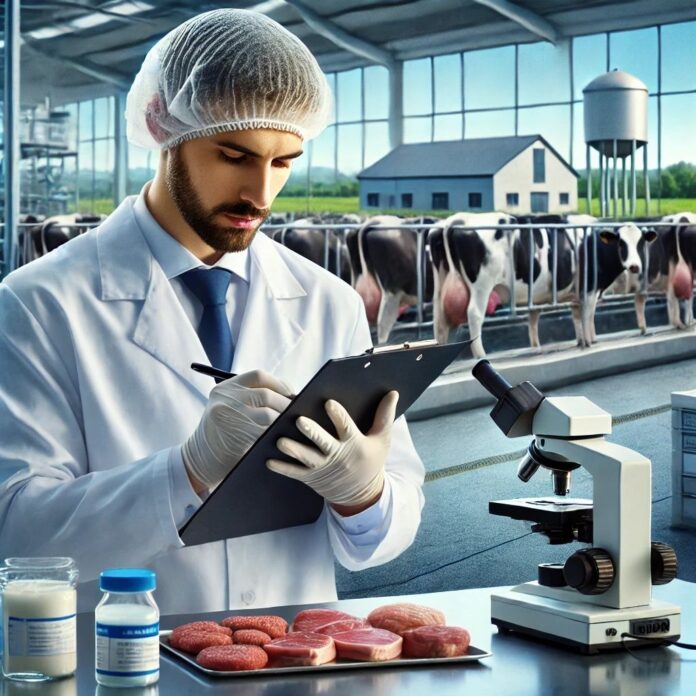From Farm to Fork: The Vital Role of Veterinarians in Food Safety – Special Reference to India
Introduction
Food safety is a critical public health concern, ensuring that the food we consume is free from contaminants, pathogens, and harmful residues. In India, where a significant portion of the population relies on animal-derived products such as milk, meat, eggs, and fish, veterinarians play a crucial role in maintaining food safety standards. From livestock management to food inspection, veterinarians serve as key players in ensuring that food remains safe from production to consumption.
Veterinarians in Livestock Health and Disease Control
The foundation of food safety begins at the farm level. Veterinarians are responsible for:
- Disease Surveillance & Control: Monitoring and controlling zoonotic diseases like brucellosis, tuberculosis, and avian influenza, which can affect both animals and humans.
- Vaccination Programs: Implementing regular vaccination schedules to prevent infectious diseases in livestock and poultry.
- Proper Medication Use: Ensuring the judicious use of antibiotics and other veterinary drugs to prevent antimicrobial resistance (AMR), a growing global concern.
- Hygienic Animal Husbandry Practices: Educating farmers on proper hygiene, biosecurity, and nutrition management to reduce the risk of disease outbreaks.
Veterinary Role in Dairy and Meat Production
India is the world’s largest producer of milk and a major producer of poultry and meat products. Veterinarians play a pivotal role in:
- Milk Safety & Quality Control:
- Monitoring dairy farms for mastitis and other infections that could compromise milk quality.
- Ensuring proper handling and pasteurization techniques to eliminate harmful bacteria.
- Meat Inspection & Processing:
- Conducting ante-mortem and post-mortem inspections at slaughterhouses to detect and eliminate diseased animals.
- Certifying meat hygiene standards to ensure compliance with the Food Safety and Standards Authority of India (FSSAI) regulations.
- Preventing Contaminants in Animal Products:
- Regulating the use of hormones and antibiotics to prevent harmful residues in milk, meat, and eggs.
- Implementing withdrawal periods before slaughter to ensure drug-free animal products.
Ensuring Food Safety in Poultry & Fisheries
Veterinarians also contribute significantly to poultry and aquaculture food safety:
- Poultry Sector:
- Controlling outbreaks of highly contagious diseases like bird flu and Newcastle disease.
- Ensuring biosecurity measures in hatcheries and farms to reduce contamination risks.
- Fisheries & Aquaculture:
- Monitoring water quality and feed safety in fish farms to prevent bacterial and parasitic infections.
- Regulating antibiotic and chemical usage to ensure safe seafood products for consumers.
Veterinarians in Food Processing & Inspection
Beyond primary production, veterinarians contribute to food processing and regulatory oversight:
- Supervising Slaughterhouses & Processing Units:
- Enforcing animal welfare regulations to ensure ethical slaughtering practices.
- Ensuring proper cold chain management to prevent spoilage and bacterial growth.
- Certifying Exports & Imports:
- Conducting veterinary health checks for export certification to meet international food safety standards.
- Monitoring imported animal products for compliance with domestic food safety laws.
- Training Food Handlers:
- Educating butchers, dairy workers, and food processors on hygiene and safe handling of animal products.
Addressing Public Health & Zoonotic Disease Control
Zoonotic diseases (those transmitted from animals to humans) pose significant food safety risks. Veterinarians play a key role in:
- Preventing the Spread of Zoonotic Pathogens:
- Managing diseases such as salmonellosis, listeriosis, and E. coli infections linked to contaminated food.
- Collaborating with Public Health Authorities:
- Working with health organizations to control outbreaks and improve foodborne illness surveillance.
Regulatory Framework & Government Initiatives in India
Veterinarians work closely with regulatory bodies such as:
- FSSAI (Food Safety and Standards Authority of India): Establishing and enforcing food safety standards for animal-derived products.
- NDDB (National Dairy Development Board): Ensuring quality control in dairy processing.
- ICAR (Indian Council of Agricultural Research): Conducting research to improve food safety practices in animal husbandry.
- State Veterinary Departments: Implementing disease control programs and food safety regulations at the grassroots level.
Challenges Faced by Veterinarians in Food Safety
Despite their critical role, veterinarians in India face several challenges:
- Lack of Awareness & Training: Many farmers and food handlers are unaware of best practices in food safety.
- Antimicrobial Resistance (AMR): Overuse of antibiotics in livestock production poses a threat to human health.
- Infrastructure Gaps: Insufficient veterinary laboratories and testing facilities hinder effective disease surveillance.
- Unregulated Slaughterhouses: Many local meat markets operate without proper veterinary oversight, increasing foodborne risks.
The Way Forward: Strengthening Veterinary Involvement in Food Safety
To enhance food safety in India, the following steps should be taken:
- Improved Veterinary Training: Enhancing education on food safety regulations and emerging health threats.
- Stronger Policy Implementation: Enforcing stricter food safety laws at all levels of production.
- Public Awareness Campaigns: Educating consumers and farmers about the importance of veterinary-led food safety measures.
- Investment in Veterinary Infrastructure: Expanding laboratory networks for better disease diagnostics and food safety monitoring.
Conclusion
Veterinarians are the unsung heroes ensuring the safety of animal-derived foods in India. From farm management to meat inspection and public health protection, their contributions are indispensable in safeguarding consumers. Strengthening their role through better policies, training, and awareness programs will enhance food safety, public health, and overall agricultural sustainability in India.



